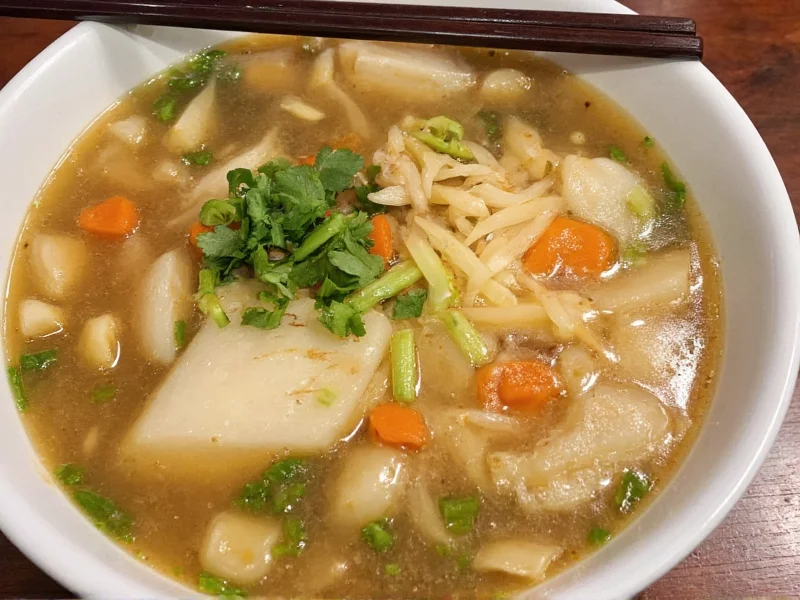Miso soup represents one of Japan's most beloved culinary traditions, appearing in nearly every Japanese meal. Beyond its comforting flavor, this fermented soybean soup offers notable nutritional properties that interest health-conscious eaters worldwide. Understanding miso soup nutritional information helps consumers make informed dietary choices while enjoying this ancient food.
Nutritional Profile of Miso Soup
While miso soup nutritional facts per serving vary based on preparation methods and ingredients, a standard restaurant-style serving provides essential nutrients without excessive calories. The fermentation process creates beneficial compounds not found in unfermented soy products.
| Nutrient | Amount per 8oz Serving | % Daily Value* |
|---|---|---|
| Calories | 35-50 | 2% |
| Protein | 2-3g | 4-6% |
| Carbohydrates | 5-7g | 2% |
| Dietary Fiber | 1-2g | 4-7% |
| Sodium | 600-900mg | 26-39% |
| Vitamin K | 15-25mcg | 13-21% |
| Manganese | 0.2-0.3mg | 9-13% |
*Percent Daily Values based on a 2,000 calorie diet. Values may vary based on specific recipe and miso paste type.
Health Benefits of Miso Soup
Miso soup nutritional information reveals several health-promoting components. The fermentation process creates probiotics that support gut health, potentially improving digestion and immune function. Research published in the Journal of Applied Microbiology confirms that miso contains live lactic acid bacteria strains that survive stomach acid.
Vitamin K content in miso soup contributes to bone health and proper blood clotting. Manganese supports metabolic functions and antioxidant activity. The isoflavones in miso, particularly genistein and daidzein, demonstrate antioxidant properties according to studies in the American Journal of Clinical Nutrition.
Sodium Content Considerations
When examining miso soup nutritional facts per serving, sodium represents the most significant concern for many consumers. Traditional miso soup contains 600-900mg sodium per serving, which constitutes 26-39% of the recommended daily limit. However, homemade versions allow for sodium reduction by:
- Using reduced-sodium miso paste
- Diluting with additional water or dashi broth
- Adding more vegetables to increase volume without adding sodium
- Choosing white miso (shiro miso) which typically contains less salt than red varieties
Miso Soup in Different Dietary Patterns
For those wondering is miso soup healthy for weight loss, the answer depends on preparation. With only 35-50 calories per serving, miso soup makes an excellent low-calorie starter that may reduce overall meal consumption. The protein and fiber content promotes satiety.
Vegans and vegetarians benefit from miso soup protein content as a plant-based protein source. Those following a heart-healthy diet should monitor sodium intake but can enjoy miso's potential cardiovascular benefits from its isoflavones.
Maximizing Nutritional Value at Home
Understanding miso soup nutritional information helps home cooks optimize its health benefits. To create the most nutritious miso soup:
- Add seaweed like wakame for additional minerals and iodine
- Incorporate tofu for increased protein (adding approximately 5-7g per serving)
- Include mushrooms for immune-supporting compounds
- Add green onions for vitamin K and antioxidants
- Mix miso paste into cooled broth (below 158°F/70°C) to preserve probiotics
These additions transform basic miso soup into a nutritionally complete meal starter while maintaining its characteristic umami flavor.
Scientific Perspective on Miso Soup Benefits
Multiple studies support miso soup health benefits backed by science. Research from Tohoku University tracking over 40,000 Japanese adults found that those consuming three or more bowls of miso soup daily had a 22% lower risk of stroke compared to those eating less than one bowl daily.
Another study in the Nutrition Journal demonstrated that regular miso consumption correlates with improved gut microbiome diversity. The fermentation process creates bioactive peptides that may offer anti-inflammatory effects according to research in the Journal of Agricultural and Food Chemistry.
Practical Considerations for Consumers
When evaluating miso soup nutritional information, consider these practical points:
- Restaurant servings often contain higher sodium levels than homemade versions
- Instant miso soup packets typically have added preservatives and higher sodium
- Different miso varieties (white, red, barley) have varying nutritional profiles
- Adding ingredients like tofu or seaweed significantly changes the nutritional composition
For those monitoring sodium intake, preparing miso soup at home provides complete control over salt content while maintaining the distinctive flavor profile that makes this soup so beloved.











 浙公网安备
33010002000092号
浙公网安备
33010002000092号 浙B2-20120091-4
浙B2-20120091-4